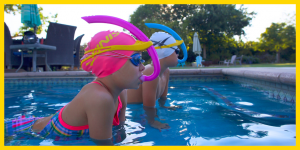January 4, 2018
You don’t need to head out into choppy, icy waters to improve your open-water skills this winter – here’s how to do it in the pool.
1. Mimic mass starts
Swimming with a triathlon or swimming club is not only a great way to improve your fitness and make new friends and training partners, but to train your open-water skills. Since most triathlons involve a mass start and competitive swimming in close quarters, being surrounded by peers in the pool is a great way to get that experience. Not only swimming with other swimmers in the same lane, but actually rehearsing a mass start and swimming side-by-side, even with as little as three of you, can be very effective. This can be a fun way to finish your daily set and it can be executed as a 4 x 25m mass start (or even 4 x 50m if you can tumble-turn underneath the swimmers behind you).
2. Drafting
One piece of good news about open-water swimming is that drafting – the act of using a person in front of you to clear a wake and pull you, while ideally not kicking you in the face – is legal. Make sure you find a good pair of legs to draft and you’ll save a lot of energy (just make sure they’re going in the right direction). If you’re in the pool with other people, you can train in these skills. When you’re swimming in a lane with 6/7 people it is hard not to draft — but you also can do drafting drills before or after any main set. By starting 2 at a time, a set of 4 x 50m focusing on drafting would definitely do the trick. And remember, you can benefit from drafting both by swimming at the hip-level of another person, and by staying behind him/her. The first option is preferred because if you lose that position you still have the second one. So train both ways.
3. Eyes Closed
Lakes and sea waters can be very dark sometimes…
Recent Articles
Dylan Carter
Chelsea Hodges
Lorenzo Zazzeri

Introducing the Stability Snorkel Jr
Share on Social Media


